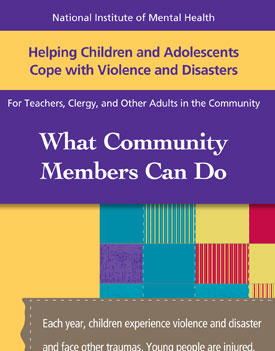Get a map or see list of locations
Helping Children and Adolescents Cope with Violence and Disasters
$0.00
“Trauma” is often thought of as physical injuries. Psychological trauma is an emotionally painful, shocking, stressful, and sometimes life-threatening experience. It may or may not involve physical injuries, and can result from witnessing distressing events. Examples of trauma include a natural disaster, physical or sexual abuse, and terrorism.
Disasters such as hurricanes, earthquakes, and floods can claim lives, destroy homes or whole communities, and cause serious physical and psychological injuries. Trauma can also be caused by acts of violence. The September 11, 2001 terrorist attack is one example. Mass shootings in schools or communities and physical or sexual assault are other examples. Traumatic events threaten people’s sense of safety.
Reactions (responses) to trauma can be immediate or delayed. Reactions to trauma differ in severity and cover a wide range of behaviors and responses. Children with existing mental health problems, past traumatic experiences, and/or limited family and social supports may be more reactive to trauma. Frequently experienced responses among children after trauma are loss of trust and a fear of the event happening again.


